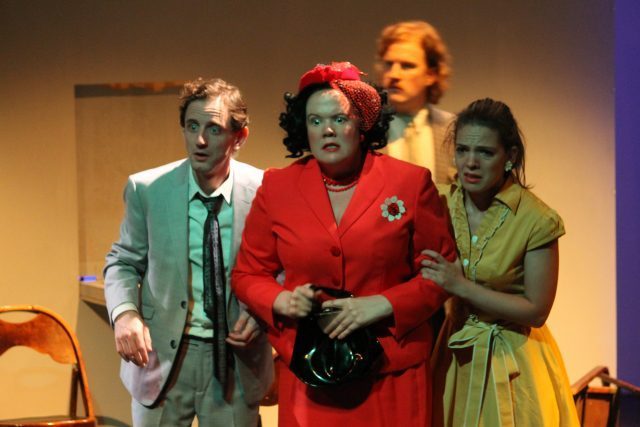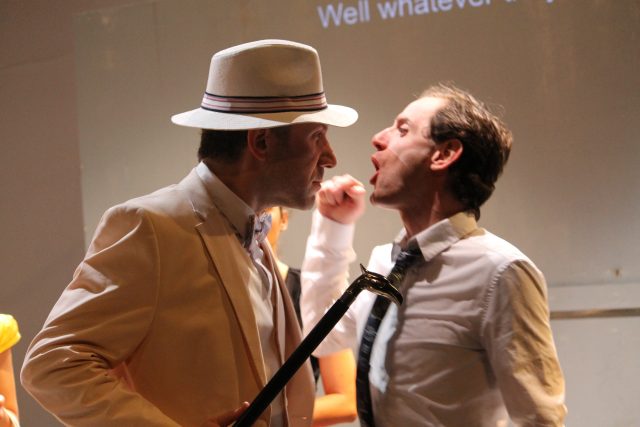
Café denizens can’t believe what they see in New Yiddish Rep adaptation of Eugène Ionesco’s Rhinoceros (photo by Pedro Hernandez)
Castillo Theatre
543 West 42nd St. between Tenth & Eleventh Aves.
Thursday – Sunday through October 8, $45
212-941-1234
www.castillo.org
www.newyiddishrep.org
With the recent success of its productions of Death of a Salesman, Waiting for Godot, and God of Vengeance, the New Yiddish Rep’s world premiere of Eugène Ionesco’s Rhinoceros in the rich, historical language promised a potential stampede. Unfortunately, Ionseco’s 1960 absurdist screed against the rise of Fascism creeps in more like a mouse in a surprisingly lackluster production. “Rhinoceros reminds me of the personal struggle of many of my current and former co-religionists who are trapped in their own skin,” translator and former Hasid Eli Rosen, who also stars as Jean, writes in a program note. He hopes the play “will penetrate the high walls of ghettos and sound the shofar of freedom to humans everywhere,” an apt metaphor as Rosh Hashanah and the Days of Awe approach, but the play falls well short of its admirable goals. Continuing at the Castillo Theatre through October 8, Rhinoceros takes place on director Moshe Yassur’s small, spare set, consisting of a few chairs and tables and walls from which further elements, such as a bed, emerge. The erudite Jean (Rosen) is waiting for Bérenger (Luzer Twersky) in a café run by a cheapskate proprietor (Amy Coleman) who regularly berates her waitress (Mira Kessler). Jean chastises Bérenger for his lack of dignity, decrying his penchant for alcohol, uncombed hair, and lack of a tie. But Berenger — Ionesco’s everyman who appears in several of his works — just wants to relax and take a break from what he considers his exhausting life. After a rhinoceros makes its way through the middle of town, the characters in the café — which also include the Logician (Alex Leyzer Burko), a housewife clutching her dear cat (Macha Fogel), the grocer (Sean Griffin), the grocer’s wife (Caraid O’Brien), a gentleman (Gera Sandler) with the hots for the housewife, and, eventually, Daisy (Malky Goldman), with whom Bérenger is smitten — start debating what they saw and what it means, even as the rhino, or perhaps a different one, marches back through town in the other direction. But when people begin actually turning into rhinos themselves, only Bérenger refuses to become part of the crash.

Jean (Eli Rosen) and Bérenger (Luzer Twersky) argue about logic, demeanor, and rhinos in Ionesco’s absurdist classic (photo by Pedro Hernandez)
In writing Rhinoceros, Romanian playwright Ionesco (Exit the King, The Chair) was inspired by the fascism that was building in Romania and across Eastern Europe in the 1930s. Rosen makes clear parallels to what is happening now in America, as antifa battles white supremacists and neo-Nazis and President Donald Trump shows dictatorial tendencies. Rosen even uses the phrase “fake news” when Botard (Burko) declares that the whole rhino story is a hoax, propaganda perpetrated by journalists and university elitists. “An example of collective psychosis,” he tells Dudard (Griffin), “just like religion — the opiate of the people!” However, the translation is too obvious in making connections to contemporary America, and the staging is static and uninvolving. What could have been intimate — the audience is seated on two sides of the catty-corner set — instead separates the two parts of the crowd and creates a distance from the actors, who are often only several feet away. The surtitles, projected on the two perpendicular walls, contain a handful of typos and sometimes can’t keep up with the spoken dialogue; in addition, when the actors spoke out of turn or missed a cue, it was hard to follow what was going on. The play has a long, distinguished history; Laurence Olivier and Joan Plowright starred in Orson Welles’s original London version, and Zero Mostel won a Tony as Jean in the 1961 Broadway edition, with Eli Wallach, Anne Jackson, and Jean Stapleton. (Mostel also starred with Gene Wilder and Karen Black in the 1974 film directed by Tom O’Horgan.) But it’s not a big-name cast that is missing from New Yiddish Rep’s version; in 2012, Emmanuel Demarcy-Mota and Théâtre de la Ville brought their wildly inventive take to BAM’s Next Wave Festival. Yassur a Romanian who has previously directed Ionesco’s Jacques, or the Submission; The Bald Soprano, and The Future Is in Eggs, never finds the right balance between absurdity and reality, getting caught in the middle, as if blinded by the dust of the stampeding animals.